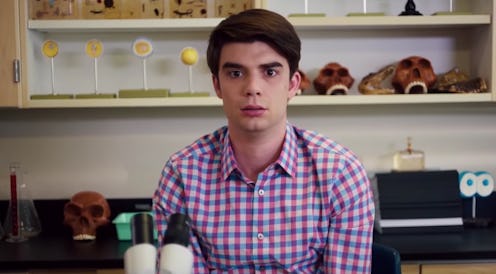In Alex Strangelove, a new Netflix movie out June 8, high school senior Alex Truelove (Daniel Doheny) struggles to understand his sexuality at a time when his friends and girlfriend are pressuring him to lose his virginity. Alex knows he doesn't want to have sex, but he doesn't quite know why — until he falls for a guy, and realizes he's gay. Many have called Alex Strangelove a raunchier version of Love, Simon due to the movies' similar themes of coming of age while coming out, and in a recent phone interview, the writer and director of Alex Strangelove, Craig Johnson, reveals that he welcomes the comparison. In fact, Johnson sees Love, Simon more as a "sister wife" to his own movie than its competition.
"I think there is room for all of us — there’s room for us and Love, Simon and Moonlight, and Call Me By Your Name, and Beats Per Minute, and all the shows out there," Johnson explains, referring to other recent LGBTQ-themed films. The director's more-the-merrier attitude points to the fact that we're finally in an age where on-screen representation is becoming more commonplace, especially in regards to LGBTQ characters. "It’s such an exciting fertile period, for queer characters and queer storylines in movies," explains Johnson. "It’s exciting to me and I certainly don’t feel threatened by any of it because I do believe there’s room for everyone."
While it might seem easy to compare Alex Strangelove to Love, Simon due to their similar themes and timing, the films are actually very different. For one thing, Alex Strangelove is inspired by Johnson's own youth experiences, particularly the elements involving Alex's relationship with his girlfriend, Claire (Madeline Weinstein).
"A lot of this movie is kind of autobiographical for me, to be quite honest, and my biggest struggle as a teenager and even in my mid-20s was [that] I would have these emotional attachments to women in my life," explains Johnson. "I had girlfriends and I was legitimately in love with them. However, there was this one thing which was sex" that, he adds, put up a barrier between them. And while he came out as bisexual in his 20s, he felt that "that label, while it works for some, kind of kept me in a holding pattern of... attempting to date women while in fact I was drawn towards men, sexually."
In Alex Strangelove, sex takes center stage; Alex is exploring his sexuality at a time when almost everyone in his life wants to talk about sex. "Teenagers live in an R-Rated world," Johnson says. "Sex and dating in high school is weird and awkward and embarrassing and nerve-wracking and I think we’re just lucky that we can now see different representations of that."
In the way it handles romance — the film doesn't solely focus on Alex's sexuality, but also delves into Claire's experience with sex and heartbreak — Alex Strangelove is actually more similar to A John Hughes movie than anything else. In fact, Johnson compares his film to Pretty in Pink due to the similarities between Claire (who supports Alex's journey but is devastated over losing her boyfriend) and Duckie (who famously got his heart broken by his longtime crush Andie, who fell for someone else). "[I] wanted to acknowledge the sh**iness and the heartbreak of the [person] in that situation," Johnson explains.
Unlike Pretty in Pink, which was set in a typical 1980s high school, Alex Strangelove takes place at a progressive school where students of all sexual and gender identities roam the halls. That makes Alex's journey to discover his identity a bit easier, but Johnson says that even in an era of increased acceptance, LGBTQ high schoolers still often struggle to come out. "Now you have so many options... So you really have to be in tune with emotionally where you are. You [still] have to deal with... a heteronormative view of society," he explains. "[But a progressive view of sexuality] makes the concept so much more: question oneself. 'What really do I want, what really am I into?' Which really is a universal question for any teenager."
And as Alex Strangelove proves, that common experience makes for rich stories to use for entertainment. As Johnson puts it, "There’s gonna be high school movies as long as there’s high school kids," and that's absolutely something to celebrate.
